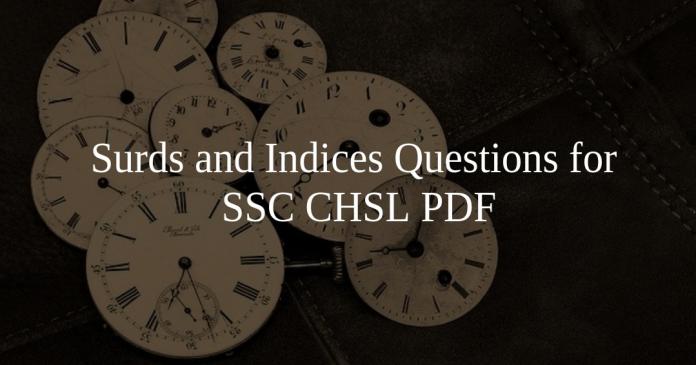Surds and Indices Questions for SSC CHSL PDF
For Previous year Surds and Indices Questions of SSC CHSL 2018-2019 Tier I exam download PDF. Go through the video of Repeatedly asked Surds and Indices questions explanations most important for the CHSL exam.
Download Surds and Indices Questions for SSC CHSL PDF
Get 200 SSC mocks for just Rs. 249. Enroll here
Take a free mock test for SSC CHSL
Download SSC CHSL Previous Papers
More SSC CHSL Important Questions and Answers PDF
Question 1: Arranging the following in descending order, we get
$\sqrt[3]{4},\sqrt{2},\sqrt[6]{3},\sqrt[4]{5}$
a) $\sqrt[3]{4}>\sqrt[4]{5}>\sqrt{2}>\sqrt[6]{3}$
b) $\sqrt[4]{5}<\sqrt[3]{4}>\sqrt[6]{3}>\sqrt{2}$
c) $\sqrt{2}>\sqrt[6]{3}>\sqrt[3]{4}>\sqrt[4]{5}$
d) $\sqrt[6]{3}>\sqrt[4]{5}>\sqrt[3]{4}>\sqrt{2}$
Question 2: Number of digits in the square root of 62478078 is:
a) 4
b) 5
c) 6
d) 3
Question 3: The approx value of $5\frac{1}{3}+1\frac{2}{9}\times \frac{1}{4}(10+\frac{3}{1-\frac{1}{5}})$ is
a) $10$
b) $\frac{67}{25}$
c) $\frac{128}{11}$
d) $\frac{128}{99}$
Question 4: Which is the largest of the following fractions ?
$\frac{2}{5},\frac{3}{5},\frac{8}{11},\frac{11}{17}$
a) $\frac{8}{11}$
b) $\frac{3}{5}$
c) $\frac{11}{17}$
d) $\frac{2}{3}$
Question 5: The simplified value of $999\frac{1}{7}+999\frac{2}{7}+999\frac{3}{7}+999\frac{4}{7}+999\frac{5}{7}+999\frac{6}{7}$ is
a) $10009\frac{2}{7}$
b) $5994\frac{6}{7}$
c) $9999\frac{2}{7}$
d) 5997
SSC CHSL Study Material (FREE Tests)
Question 6: If $x=6+2\sqrt{6}$, then what is the value of $\sqrt{x-1}+\frac{1}{\sqrt{x-1}}$ ?
a) $2\sqrt{3}$
b) $3\sqrt{2}$
c) $2\sqrt{2}$
d) $3\sqrt{3}$
Question 7: If $x=\frac{2\sqrt{15}}{\sqrt{3}+\sqrt{5}}$, then what is the value of $\frac{x+\sqrt{5}}{x-\sqrt{5}}+\frac{x+\sqrt{3}}{x-\sqrt{3}}$
a) $\sqrt{5}$
b) $\sqrt{3}$
c) $\sqrt{15}$
d) $2$
Question 8: Which value among $\sqrt[3]{5},\sqrt[4]{6},\sqrt[6]{12},\sqrt[12]{276}$ is the largest ?
a) $\sqrt[3]{5}$
b) $\sqrt[4]{6}$
c) $\sqrt[6]{12}$
d) $\sqrt[2]{12}$
Question 9: If $x-y-\sqrt{18}=-1$ and $x + y – 3\sqrt{2} = 1$, then what is the value of $12xy(x^{2} – y^{2})$ ?
a) $0$
b) $1$
c) $512\sqrt{2}$
d) $612\sqrt{2}$
Question 10: If $\frac{p}{q}=\frac{r}{s}=\frac{t}{u}=\sqrt{5}$, then what is the value of $[\frac{(3p^{2} + 4r^{2} + 5t^{2})}{(3q^{2} + 4s^{2} + 5u^{2})}]$ ?
a) 1/5
b) 5
c) 25
d) 60
Question 11: If $x+[\frac{1}{(x+7)}]=0$, then what is the value of $x-[\frac{1}{(x+7)}]$ ?
a) $3\sqrt{5}$
b) $3\sqrt{5}-7$
c) $3\sqrt{5}+7$
d) $8$
Question 12: If $\frac{x+\sqrt{x^2-1}}{x-\sqrt{x^2-1}}+\frac{x-\sqrt{x^2-1}}{x+\sqrt{x^2-1}}=194$, then what is the value of x?
a) 7/2
b) 4
c) 7
d) 14
Question 13: If $x=8+2\sqrt{15}$, then what is the value of $\sqrt{x}+\frac{1}{\sqrt{x}}$ ?
a) $2\sqrt{5}$
b) $2\sqrt{3}$
c) $\frac{(3\sqrt{5}+\sqrt{3})}{2}$
d) $\frac{(3\sqrt{3}-\sqrt{5})}{2}$
Question 14: What is the value of $\frac{1+a}{a^{\frac{1}{2}}+a^{\frac{-1}{2}}}-\frac{a^{\frac{1}{2}}+a^{\frac{-1}{2}}}{1+a}+a^{\frac{-1}{2}}$ ?
a) $\sqrt{a}$
b) $\frac{1}{\sqrt{a}}$
c) $\sqrt{a}+1$
d) $\sqrt{a}-1$
Question 15: If $\frac{\sqrt{5+x}+\sqrt{5-x}}{\sqrt{5+x}-\sqrt{5-x}}=3$, then what is the value of x?
a) 5/2
b) 25/3
c) 4
d) 3
Answers & Solutions:
1) Answer (A)
Expression : $\sqrt[3]{4},\sqrt{2},\sqrt[6]{3},\sqrt[4]{5}$
= $4^{\frac{1}{3}} , 2^{\frac{1}{2}} , 3^{\frac{1}{6}} , 5^{\frac{1}{4}}$
Now, L.C.M. of the powers i.e. 3,2,4,6 = 12
Multiplying the powers by 12 in each of the numbers, we get :
= $4^4 , 2^6 , 3^2 , 5^3$
= $256 , 64 , 9 , 125$
Now arranging them in descending order,
=> $256 > 125 > 64 > 9$
$\equiv$ $\sqrt[3]{4} > \sqrt[4]{5} > \sqrt{2} > \sqrt[6]{3}$
2) Answer (A)
When the number of digits in a no. is 7 or 8 , then no. of digits in square root will be 4.
62478078 has 8 digits, => Its square root has 4 digits.
3) Answer (A)
$5\frac{1}{3}+1\frac{2}{9}\times \frac{1}{4}(10+\frac{3}{1-\frac{1}{5}})$
$5\frac{1}{3}+1\frac{2}{9}\times \frac{1}{4}(10+\frac{15}{4})$
$\frac{16}{3}+\frac{11}{9}\times \frac{55}{16}$ = 9.9 ~ 10
4) Answer (A)
Fractions : $\frac{2}{5},\frac{3}{5},\frac{8}{11},\frac{11}{17}$
L.C.M. of 5,11,17 = 935
Now, multiplying each fraction by 935, we get :
=> 374 , 561 , 680 , 605
Since, among these numbers, 680 is the largest $\equiv \frac{8}{11}$
=> $\frac{8}{11}$ is the largest.
5) Answer (D)
we need to find value of $999\frac{1}{7}+999\frac{2}{7}+999\frac{3}{7}+999\frac{4}{7}+999\frac{5}{7}+999\frac{6}{7}$
$6000 – \frac{1+2+3+4+5+6}{7}$
= 6000 – $\frac{21}{7}$
= 6000 – 3 = 5997
6) Answer (A)
We need to calculate $\sqrt{x-1}+\frac{1}{\sqrt{x-1}}$
This equals $\frac{x-1 + 1}{\sqrt{x-1}} = \frac{x}{\sqrt{x-1}}$
$x-1 = 5+2\sqrt{6} = (\sqrt{3} + \sqrt{2})^2$
Therefore, $\sqrt{x-1} = \sqrt{3} + \sqrt{2}$
Hence, the required expression becomes $\frac{6+2\sqrt{6}}{\sqrt{2}+\sqrt{3}}$
This equals $2*\frac{3+\sqrt{6}}{\sqrt{2}+\sqrt{3}}=2\sqrt{3}$
7) Answer (D)
$x=\frac{2\sqrt{3}\sqrt{5}}{\sqrt{3}+\sqrt{5}}$
$\frac{x}{\sqrt{5}}=\frac{2\sqrt{3}}{\sqrt{3}+\sqrt{5}}$
By C-D rule,
$\frac{x+\sqrt{5}}{x-\sqrt{5}}=\frac{3\sqrt{3}+\sqrt{5}}{\sqrt{3}-\sqrt{5}}$——-(1)
and
$\frac{x}{\sqrt{3}}=\frac{2\sqrt{5}}{\sqrt{3}+\sqrt{5}}$
$\frac{x+\sqrt{3}}{x-\sqrt{3}}=\frac{3\sqrt{5}+\sqrt{3}}{\sqrt{5}-\sqrt{3}}$——-(2)
add (1) & (2)
$\frac{x+\sqrt{5}}{x-\sqrt{5}}+\frac{x+\sqrt{3}}{x-\sqrt{3}}$
= $\frac{3\sqrt{3}+\sqrt{5}}{\sqrt{3}-\sqrt{5}}+\frac{3\sqrt{5}+\sqrt{3}}{\sqrt{5}-\sqrt{3}}$
= $\frac{2\sqrt{3}-2\sqrt{5}}{\sqrt{3}-\sqrt{5}}$
= $2$
so the answer is option D.
8) Answer (A)
Values : $\sqrt[3]{5},\sqrt[4]{6},\sqrt[6]{12},\sqrt[12]{276}$
Taking L.C.M. of exponents, => L.C.M.(3,4,6,12) = 12
Now, multiplying all the exponents by 12, we get :
Values : $(5)^4,(6)^3,(12)^2,(276)^1$
= $625,216,144,276$
Thus, $625\equiv \sqrt[3]{5}$ is the largest.
=> Ans – (A)
9) Answer (D)
Given : $x-y-\sqrt{18}=-1$
=> $x-y=\sqrt{18}-1$ ————-(i)
Squaring both sides,
=> $(x-y)^2=(\sqrt{18}-1)^2$
=> $x^2+y^2-2xy=18+1-2\sqrt{18}$
=> $x^2+y^2-2xy=19-2\sqrt{18}$ ————–(ii)
Also, $x + y – 3\sqrt{2} = 1$
=> $x+y=\sqrt{18}+1$ ————-(iii)
Squaring both sides,
=> $(x+y)^2=(\sqrt{18}+1)^2$
=> $x^2+y^2+2xy=18+1+2\sqrt{18}$
=> $x^2+y^2+2xy=19+2\sqrt{18}$ ————–(iv)
Subtracting equation (ii) from (iv),
=> $4xy=4\sqrt{18}$
=> $12xy=12\sqrt{18}$ ————(v)
Multiplying equations (i) and (iii),
=> $(x-y)(x+y)=(\sqrt{18}-1)(\sqrt{18}+1)$
=> $x^2-y^2=18-1=17$ ———–(vi)
Now, multiplying equations (v) and (vi), we get :
=> $12xy(x^{2} – y^{2})= (12\sqrt{18})\times17$
= $204\sqrt{18}=612\sqrt2$
=> Ans – (D)
10) Answer (B)
Given : $\frac{p}{q}=\frac{r}{s}=\frac{t}{u}=\sqrt{5}$
=> $p=\sqrt5q$ , $r=\sqrt5s$ , $t=\sqrt5u$
To find : $[\frac{(3p^{2} + 4r^{2} + 5t^{2})}{(3q^{2} + 4s^{2} + 5u^{2})}]$
= $\frac{3(\sqrt5q)^2+4(\sqrt5s)^2+5(\sqrt5u)^2}{3q^2+4s^2+5u^2}$
= $\frac{15q^2+20s^2+25u^2}{3q^2+4s^2+5u^2}$
= $\frac{5(3q^2+4s^2+5u^2)}{3q^2+4s^2+5u^2}=5$
=> Ans – (B)
11) Answer (B)
Given : $x+[\frac{1}{(x+7)}]=0$ ———–(i)
=> $\frac{x^2+7x+1}{x+7}=0$
=> $x^2+7x+1=0$
=> $x=\frac{-7\pm\sqrt{49-4}}{2}$
=> $x=\frac{3\sqrt{5}-7}{2}$ ———–(ii)
From equation (i), => $\frac{1}{(x+7)}=-x$ —————(iii)
To find : $x-[\frac{1}{(x+7)}]$
Substituting values from equations (ii) and (iii), we get :
= $x-(-x)=2x$
= $2\times\frac{3\sqrt5-7}{2}$
= $3\sqrt5-7$
=> Ans – (B)
12) Answer (C)
Given : $\frac{x+\sqrt{x^2-1}}{x-\sqrt{x^2-1}}+\frac{x-\sqrt{x^2-1}}{x+\sqrt{x^2-1}}=194$
=> $\frac{(x+\sqrt{x^2-1})^2+(x-\sqrt{x^2-1})^2}{(x-\sqrt{x^2-1})(x+\sqrt{x^2-1})}=194$
=> $\frac{(x^2+x^2-1+2x\sqrt{x^2-1})+(x^2+x^2-1-2x\sqrt{x^2-1})}{x^2-(x^2-1)}=194$
=> $\frac{4x^2-2}{1}=194$
=> $4x^2=194+2=196$
=> $x^2=\frac{196}{4}=49$
=> $x=\sqrt{49}=7$
=> Ans – (C)
13) Answer (C)
Given : $x=8+2\sqrt{15}$
=> $x=5+3+2\sqrt{(5)(3)}$
=> $x=(\sqrt5)^2+(\sqrt3)^2+2(\sqrt5)(\sqrt3)$
=> $x=(\sqrt5+\sqrt3)^2$
=> $\sqrt{x}=\sqrt5+\sqrt3$ ————(i)
Now, $\frac{1}{\sqrt{x}}=\frac{1}{\sqrt5+\sqrt3}$
=> $\frac{1}{\sqrt{x}}=\frac{1}{\sqrt5+\sqrt3}\times\frac{(\sqrt5-\sqrt3)}{(\sqrt5-\sqrt3)}$
=> $\frac{1}{\sqrt{x}}=\frac{\sqrt5-\sqrt3}{5-3}=\frac{\sqrt5-\sqrt3}{2}$ ———–(ii)
Adding equations (i) and (ii), we get :
=> $\sqrt{x}+\frac{1}{\sqrt{x}}=(\sqrt5+\sqrt3)+(\frac{\sqrt5-\sqrt3}{2})$
= $\frac{2\sqrt5+2\sqrt3+\sqrt5-\sqrt3}{2}=\frac{3\sqrt5+\sqrt3}{2}$
=> Ans – (C)
14) Answer (A)
Expression : $\frac{1+a}{a^{\frac{1}{2}}+a^{\frac{-1}{2}}}-\frac{a^{\frac{1}{2}}+a^{\frac{-1}{2}}}{1+a}+a^{\frac{-1}{2}}$
= $(\frac{1+a}{\sqrt{a}+\frac{1}{\sqrt{a}}})-(\frac{\sqrt{a}+\frac{1}{\sqrt{a}}}{1+a})+(\frac{1}{\sqrt{a}})$
= $(\frac{1+a}{\frac{1+a}{\sqrt{a}}})-(\frac{\frac{1+a}{\sqrt{a}}}{1+a})+(\frac{1}{\sqrt{a}})$
= $\sqrt{a}-\frac{1}{\sqrt{a}}+\frac{1}{\sqrt{a}}=\sqrt{a}$
=> Ans – (A)
15) Answer (D)
Expression : $\frac{\sqrt{5+x}+\sqrt{5-x}}{\sqrt{5+x}-\sqrt{5-x}}=3$
Rationalizing the denominator,
=> $\frac{\sqrt{5+x}+\sqrt{5-x}}{\sqrt{5+x}-\sqrt{5-x}}\times \frac{\sqrt{5+x}+\sqrt{5-x}}{\sqrt{5+x}+\sqrt{5-x}}=3$
=> $\frac{[(\sqrt{5+x})+(\sqrt{5-x})]^2}{(\sqrt{5+x})^2-(\sqrt{5-x})^2}=3$
=> $\frac{(5+x)+(5-x)+2(\sqrt{5+x})(\sqrt{5-x})}{(5+x)-(5-x)}=3$
=> $\frac{10+2\sqrt{25-x^2}}{2x}=3$
=> $5+\sqrt{25-x^2}=3x$
=> $3x-5=\sqrt{25-x^2}$
Squaring both sides, we get :
=> $(3x-5)^2=(\sqrt{25-x^2})^2$
=> $9x^2+25-30x=25-x^2$
=> $10x^2-30x=0$
=> $10x(x-3)=0$
=> $x=0,3$ [But $x$ can’t be zero because the denominator can’t be zero]
=> Ans – (D)





